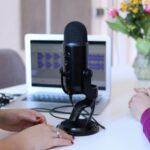Making Coffees Count: Informational Interviews that Land Jobs
If you are reading this, you have hopefully abandoned the practice of putting out those generic requests for anyone and everyone who comes across your Twitter feed to “please RT my resume to anyone and everyone, I’ll take anything, please.” (Who does that, you ask? The Dallas reporter for whom a version of this post was originally written this past weekend.)
Think instead about your job search as a political campaign. You might put out a blast on social media to test name recognition in early polling but you certainly wouldn’t rely on that to secure the votes needed to bring home the election. At the end of the day, a tight primary always goes to the candidate with the better ground game. Your personal quest for a rewarding position is no different: it really comes down to knocking on every possible individual door ahead of time.
Why vagueness won’t work
By simply putting your job request out there in the Twitterverse aimed at no one and nothing in particular, the danger is twofold: one, you trick yourself into thinking you have accomplished something constructive toward your job search (eating up valuable time and energy which could have been spent on something with actual payoff) and, two, you unwittingly inspire the bystander effect in people who might have actually helped had you approached them differently — that is, more directly. Here is an article by a professional resume writer on the bystander effect (which is when individuals witnessing a crisis in a crowd do nothing because they tell themselves someone else will address it) within the job search context.
Making coffees count
A more effective approach, then, is to schedule as many coffee/tea/water/Redbull dates as humanly possible in the next two weeks with every person working in your target field within a 50-mile radius of your dream office location, e.g. White House. If the person you approach is too far/too busy for a face-to-face meeting, see if you can secure a Skype chat. (Visual is better as it secures the other person’s attention while showing off your ease with multimedia.) At each meeting, you are NOT to ask for a job. Instead, you ask ONLY the following two questions:
1) How did you get where you are today?
2) What two other people do you recommend I meet with to learn more about growing as a [insert goal job title here]?
The first is obviously an open-ended question and you will listen as intently as if you were learning from the most recent winner of the Nobel Prize in your field. Consider speaking only to agree or clarify or whatever charming punctuation will keep them talking about themselves.
The second question is a direct ask. Try to get the recommended names and numbers on the spot. But if the person offers to do an email introduction once they get back to their desk, all the better. (Don’t be a pest, but be sure to follow up and get those names within three days.)
A bullseye requires follow-through
Immediately after the initial meeting (we’re talking 30 minutes max), send your coffee companion a three-line email:
1) Thanks for making the time to meet … 2) I got so much out of your experience x, y, or z (concisely reference a personal anecdote or career tip they shared) and 3) I can let you know how my meetings with x and y go (the names they gave you) if you like.
As long as you keep your followup brief, concrete, and sincere, the recipient will typically become more invested in your success and, suddenly, become a member of #teamyou. When an appropriate opening comes up in their office or in a friend’s, you will be the first person to pop into their mind. Assuming you are reasonably qualified for your target occupation, positive buzz will start to generate about you and, instead of waiting for a slot to come open, they may even work to find ways to create one if none exists. (There is a lot of flexibility in how congressional offices are structured to allow for more or less staffers as long as they stay within the office’s overall budget cap.)
So, that’s how this thing works. If you do what I suggest you should have several offers to choose from by the close of the first quarter of 2015. The offers may not be amazing or lucrative, and they may even entail moving out of the area (back to a district office, for instance), but they will pay fairly and be in your field. An actual step forward.
More follow-through
Now, once you have your referrals in hand, do not sleep on them or you will lose all credibility with your recommender. Rather, try to meet with your recommender’s referrals within 7 days. Once you have finished the two referral meetings, also take a moment to email a brief thanks to your original recommender. This will close the loop and won’t leave them feeling used or you looking like a flake. In fact, they may be waiting to hear back from you to let you know about that newly-created role, right?
Joining AF can kickstart your coffee options
By the way, people will tend to refer you to people of equal or lesser power so 1) aim as high as you can to start and, as a result of this phenomenon, 2) your referral chains will naturally peter out at some point. So, in addition to following up on referrals, keep asking new people at the top of their careers for coffee meetings. Once you have exhausted all your own contacts, where else is there to turn? One place is by attending America’s Future mixers on a regular basis.
You can also cold call people you see on TV, on the web, or in print. Be extremely polite but don’t be shy. If you are fearless and diligent in performing work you are assigned, then you have nothing to fear in putting in this level of effort and determination in landing a position in the first place. Bring that same courage and eyeball-to-eyeball approach to securing a great position as you do to everything else of great value in your life. Your humble steady confidence will shine and make you the ideal candidate in every interviewer’s mind.
Good luck and happy hunting!




